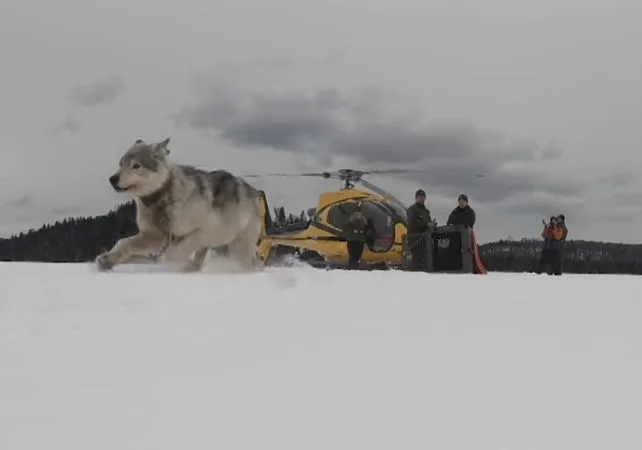
Canadian wolves deployed to U.S. park on anti-moose mission
Canadian wolves have been airlifted into a U.S. national park, part of a mission not only to restore the natural balance of the area but also with a longer view to ensuring the future of the region's predator population.
A total of four wolves were released into Isle Royale National Park in Lake Superior. The park is in U.S. waters but is a closer to the Ontario coast than to Michigan, not far from Thunder Bay. Two were gathered from Michipicoten Island Provincial Park on the eastern side of the lake, and two more were captured on crown land near Wawa. All four were transported to Isle Royale by aircraft from Ontario's ministry of natural resources and forestry (OMNRF).
"The wolves were handled with care, and aerial capture using a net gun during the winter months is safest for the animals and the most effective method for being able to selectively capture wolves," OMNRF spokesperson Jolanta Kowalski told CBC News.
The harsh winter on both sides of the border delayed the capture of the animals, and a brief lull earlier this month cleared the way for the operation.
By all accounts, it was a crashing success: Despite being transported hundreds of kilometres away from their home territory, the wolves soon found the trail of others of their kind who had been transported there late last year.
"These large males, all around 90 pounds, will almost certainly know what to do when they encounter a moose," Mark Romanski, Division Chief of Natural Resources for Isle Royale National Park, said in a news release.
WATCH BELOW: PACK OF ENDANGERED WOLVES WEATHER 'BOMB CYCLONE' TOGETHER
The wolves' mission is twofold.
First, it's hoped they will serve as a check on the island's moose population, which IFLScience reports has exploded over the past few decades, putting a strain on the local ecosystem.
Second: Repopulation. IFLScience says thanks to climate change and the decline of lake ice, winter land bridges to the island gradually became less common, such that the island's wolf population fell from around 50 individuals in 1980 to only two in 2016.






